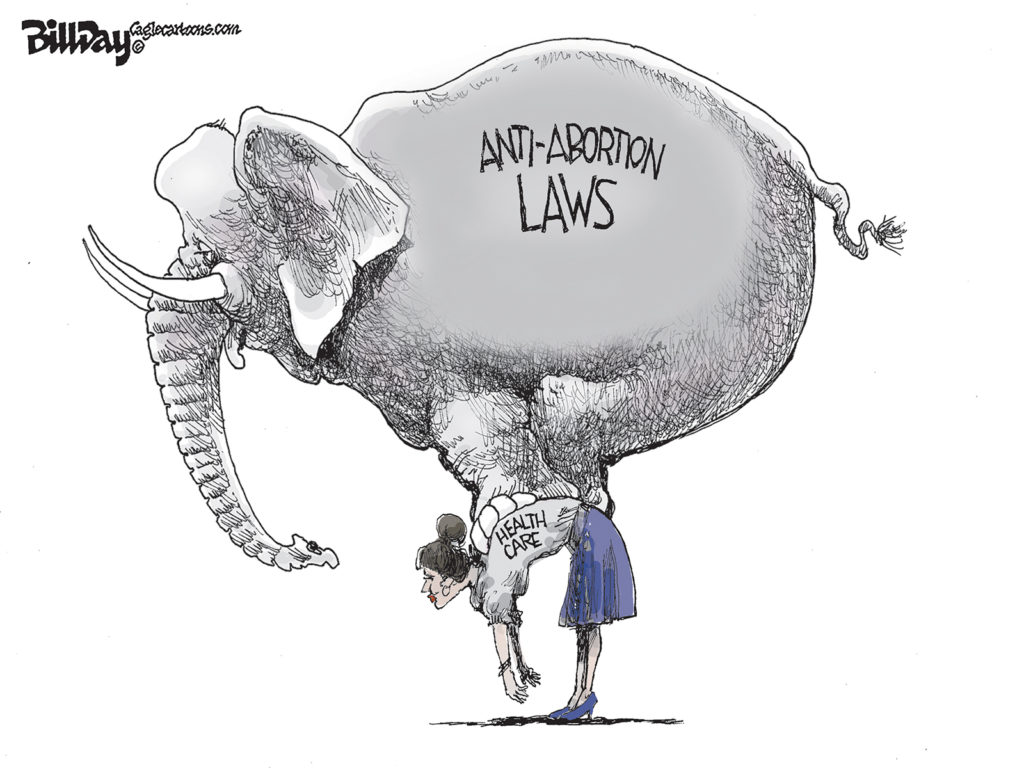McKesson Corporation’s request for the munificence of the Memphis and Shelby County Industrial Development Board frames up one of the primary fallacies in the unbridled IDB policies that waive $32 million in city-county taxes this year.
McKesson, the largest health care company in the world with annual revenues of $109 billion, contends that it must have $8.1 million in tax breaks to spend $60 million to upgrade two distribution buildings in Southeast Shelby County. Of course, like any company paying attention to what stampedes the IDB into action, McKesson said that if it doesn’t get its tax waivers, it will be forced to build in Mississippi.
In McKesson’s case, however, for once, it may be true. The question is: why should we care?
The Economy is Regional
Last year, it moved some operations from Memphis to build a $115 million national distribution center in Olive Branch. As usual, Mississippi Governor Haley Barbour, a man of little shame, issued press releases praising the big win for his state. Considering that the Barbour strategy is built on stealing companies from Memphis, his praise was akin to a bank robber acting like we should celebrate by the size of his checking account.
But the question remains: should we care?
The two operations for which McKesson is asking Memphis and Shelby County to waive taxes employs 246 jobs, and although the media tends to say things like “Memphis loses jobs to Mississippi,” in a regional economy, is it really a big deal to our economic development plans if these jobs move a grand total of five miles south of their present location? It may be across the Mississippi state line, but it’s adding little more than five minutes to the drives of Memphis employees working at McKesson’s warehouses now. Either we’re a regional economy or we’re not.
McKesson isn’t promising to create more jobs at its present Memphis locations. It’s asking for tax breaks for improving its buildings, reminding us once again how the IDB matrix overemphasizes buildings. As for us, we’re much more interested in people. It’s one of the curious things about our current economic crisis. Corporations are recording the highest profits in history but still failing to create jobs.
Open Up the IDB
In addition, in our community, real estate development has too often masqueraded as economic development, and because of it, we have approved tens of millions of tax breaks for the warehouse and distribution industry, which routinely pays low wages and does little to upgrade the skills of our workforce.
It’s not like Memphis and Shelby County are receiving a lot of tax revenue from the McKesson neighborhood in Southeastern Shelby County. Much of the distribution facilities there already have tax freezes, and the decision of the IDB to loosen up the rules governing warehouses ensures that most of them won’t pay taxes.
It’s been five years this week that we first suggested that if the IDB is convinced that the tax freezes are smart policy, they should post them on-line. To its credit, earlier this year the Downtown Memphis Revenue Finance Corporation showed how it’s done. It became the first agency that matched its rhetoric about openness with openness itself. You can see the terms of its $8.3 million in tax freezes and their beneficiaries here.
In November, 2009, new Memphis Mayor A C Wharton issued an executive order on transparency, putting employee salaries, contracts, and municipal debt online for the first time. Unfortunately, tax freezes were not included, but since the joint city-county IDB is administratively under Shelby County Government, we assume that direction by Shelby County Mayor Mark Luttrell would be needed to make this happen.
Hope Springs Eternal
Soon, the IDB will become part of the new city-county umbrella agency, EDGE, so hopefully, to demonstrate the new attitude and new philosophy being brought to economic development, its board will put actions on public incentives on line so the people paying for them can see what’s happening.
It would dispel suspicion if the public could see the length of each PILOT, how much in city and county taxes are being waived, the number of jobs being created and their average wages, and the beneficiaries. Surely, there’s no reason that advocates of the status quo with the PILOT program wouldn’t object, since they confidently praise the program’s worth and tell the public that it’s good public policy.
Often, it’s a case of the rich get richer because small businesses get no such financial incentives. It’s also often a case of the poor staying poor, because some of the companies that enjoy the largesse of government barely pay enough to keep its employees from needing public social services.
In other words, this is an issue that deserves serious consideration based on its public policy implications rather than its political implications. In the end though, if people want to argue that the PILOT program should be protected from the fundamental reform that it needs, the least they can do is show us what they are talking about.
Changing With the Times
The transparency of local tax freezes is long overdue.
From 1995 to 2005, local agencies handed out seven times more tax freezes than all the other urban counties in Tennessee combined. That trend continues today. It’s an addiction that the Betty Ford Clinic would be hard-pressed to cure, but somehow, we have to begin to compete with higher quality of life and better workforce than bribes to companies.
The lack of attention to the factors that drive economic growth today creates a cynical reinforcing cycle. Without these drivers of growth, we justify more tax freezes because our labor force isn’t good enough, smart enough, or skilled enough. We’ve used this justification for 20 years, a period of time in which we never mounted the kind of serious workforce development plan that we need.
The tax freeze program has lost public support and credibility because of the IDB’s pro forma approval of any application whose paperwork was filled out correctly. In a 10-year period, for every tax freeze approved in Nashville, Memphis approved 83.
Creating an EDGE
Decades ago, Nashville decided to build its economic development policy on quality – quality government, quality of life, and quality of public investments. It set out to execute “quality strategies” that make it a magnet for young college-educated workers and skilled jobs. It identified key public investments to make this happen. It rejected the notion that a city should sell itself at a discount to get jobs and people to move there.
It took 20-25 years, but Nashville got it done because it had a plan based on quality rather than cheapness and it executed it. That’s why we’re so hopeful about EDGE. It’s time for a reassessment and a recalibration. It’s time for a new look at our old economic development thinking. It’s time to take a more businesslike approach to the public’s business.
Meanwhile, the beat goes on at the IDB.
And just for the record, the $8.1 million tax benefit requested by McKesson Corporation is the amount of revenues that it takes in every 40 minutes.





“is it really a big deal to our economic development plans if these jobs move a grand total of five miles south of their present location?”
It apparently is if you are an inner city councilman…
Here is the true foundation of the issue when applying regional to our local scene. Memphis is unique as a major city located in such close proximity to the shared border of 3 separate states. Only 2 other cities share this same difficult distinction- New York City and Washington (perhaps Cincinnati if we stretched things a bit) and these are definite apples to oranges comparison. This is important because the political and economic victory of luring a company from one location to another location only 5 miles away is removed when the other county is in the same state. Said state would incur a net loss in such a transaction and even the most ignorant citizen will not cheer a governor who misspent state funds in such a manner. Then again we cannot overlook the lessons offered by those cities: where is our “Tri- State Port Authority, a “Tri-State Park & Open Space Commission” or a true tri-state planning board (an MPO with teeth)?
Mississippi and Arkansas are obviously uninterested in raising the economic development bar. Why would they be when it is so much easier and requires so little effort to simply pick the low hanging fruit within arm’s length in the neighbor’s yard. The reason we are forced to care is because in order for the city to generate the necessary funds to support and pursue quality economic development, we must maintain a stable real estate market which in turn generates local tax revenue. Even if the property tax freeze removes the direct economic windfall for the city and county, it does provide the indirect benefit of ensuring a stable and healthy industrial real estate market which allows for higher valuations on industrial properties across the city and county. That in turn yields higher tax revenue. A shrinking industrial real estate market will eventually yield a smaller taxable base and thus less revenue to fuel a retooling of the local economy. It’s all very catch-22.
I know I will sound like a broken record, but to alter the regional economic outlook we will need to have the benefit of a regional approach to taxation which would require an extremely enlightened set of state governors or in the very least we need state leadership that is uninterested in playing politics with our local economy. Unfortunately these little sound bites of economic development make great fodder during election years in “their” states. The other more risky option is to simply stop playing the game as SCM suggests and reset the local economy in a matter of years, not decades. The last option would require monumental political and private market will and effort at the local and state level, an unprecedented degree of cooperation between local leaders and a laser like focus on the goal.
You are right, and we stand with you for regional tax-sharing. I believe you and we have advocated it before. We just worry that it’s like consolidation. We risk not doing anything for decades because we are waiting for the perfect answer instead of a good one.
It’s unlikely to come, so we need to ask ourselves harder questions about tax freezes. Have they improved the standard of living in our county? Have they encouraged sprawl and a proliferation of warehouses/distribution that chew up way too much land and with way too little return in revenues?
Years ago, OPD hired a consultant to develop an economic impact matrix for projects, and when it came time to deliver his report, he said that his computer apparently had garbled the data. When he double checked, his computer was operating correctly. It just kicked out an error message because it had never calculated an economy out of whack like ours and as much wide expanses of land that were not paying property taxes. The change in IDB rules mean that warehouses and distribution more often than not are not paying taxes. Sadly, we don’t have industrial properties in the sense of other cities because ours are so out of balance with warehouses and distribution centers.
There are only two MSAs with three separate states in them among the 50 largest metros, but 12 metros have two states – and in our case, Arkansas is nonentity. We just think we need to shift from selling ourselves at a discount and begin to sell ourselves for smart public investments (CIP and PILOTs) that attract and encourage the jobs in a knowledge economy.
And as you know, we’re with you on having an MPO with teeth, vision, and real planning. And that isn’t controlled by suburban interests. There is so much harm that has been caused by the current MPO.
Sadly, 10 years ago, all three governors came together to support the Governor’s Alliance for Regional Excellence that was based on the report funded by our Chamber. Our local political leadership – to your point – was not ready to push it ahead and it was a lost opportunity for our best chance to develop a regional agenda.
It’s possible to resurrect that plan and we are confident that Wharton and Luttrell would be willing to breathe life into it and meet with the governors. But it just has to be on somebody’s agenda and that’s always the trick to moving things ahead.
As usual, your insights were lucid and helpful in thinking and talking this through. Thanks.
SCM — You can indeed see a list of which companies have PILOTs and the length of each PILOT. That’s online on the Office of Economic Development’s website (http://www.shelbycountytn.gov/index.aspx?nid=308). Look at the link on that page entitled “Current PILOT Program Participants” for a spreadsheet with that info. Unfortunately, that’s as much info as Shelby County government seems willing to share on its website at this time.
SCM, when you say that it was LOCAL political leadership unwilling to push the recommendations from the Governor’s Alliance for Regional Excellence, do you mean Memphis leadership? Why in the world would that be? Or are you referring to the inability of Memphis/Shelby County and DeSoto County to get along?
I’m curious about the specifics of the Governor’s Alliance for Regional Excellence proposals. Do you have a copy of the Memphis Regional Sourcebook, or whatever other published report there might have been?
Thanks, Anonymous.
The IDB list doesn’t match up with the trustee’s list. In the trustee’s PILOT report, he says that the IDB didn’t provide sufficient information to completely reconcile property leases.
What we’d like is a complete list on the IDB site with amounts, beneficiaries, etc. We’d also love to see the applications and what the companies are promising, but we don’t want to get greedy.
Wes: Here’s the link to the Sourcebook: http://www.memphisregion.com/getsourcebook.asp
The tens of millions of dollars in tax abatements granted in the last decade clearly did nothing to reverse the movement of people out of Memphis and Shelby County during the decade, the results from the 2010 Census show. The outflow reached an all-time high.
The statistics also show that many people are leaving the Memphis metro area entirely.
Let’s be sure to clarify jcov40’s statement and speaking toward’s SCM’s point: while an outmigration from Shelby County continues, the population of the county continues to increase albeit at a relatively slow pace. Shelby County is now the most heavily populated county in the Southeast outside of Florida and Texas. 1 in 7 Tennesseans live in Shelby County. DeSoto County is the fastest growing county in Mississippi as well as one of that state’s most populated places. The reason this is important is because such statistics mean that local political leaders and representatives can tap into this somewhat undeveloped political resource: sheer numbers. Aligned, these populations could carry a loud voice in their respective state legislatures and governor’s offices.
If they would work together, urbanut. They’ve shown little propensity to do so.
Thanks for posting this article – very important for all citizens to know, and there’s very little transparency on the subject or news coverage on it.
One question – where did you get the the figure of 8.3 million in abatements from the Downtown Memphis Revenue Finance Corporation? As far as I can tell, their PILOT report on the website only lists what little tax PILOT recipients do owe – and not how much they get in breaks.
Or am I reading the report wrong?
We used the May report of the Shelby County trustee, who know has the June report online: http://www.shelbycountytrustee.com/PILOTReports/b_Monthly%20Summary%20Reports/June%20In%20Lieu%20Municipality%20Breakdown_2011.pdf
We’re unable to open the page on the Downtown Memphis Commission’s website to compare.